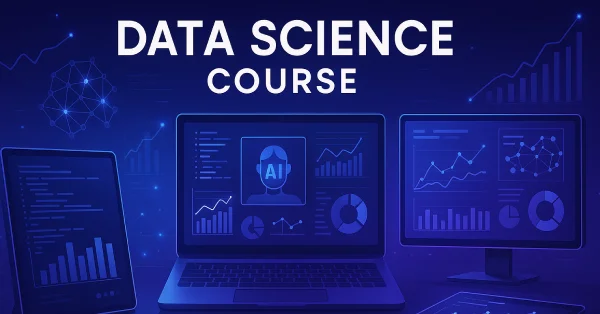How a Data Science Course Prepares You for AI Careers
Artificial Intelligence (AI) is reshaping industries worldwide. From automation in manufacturing to predictive healthcare systems and financial forecasting, AI has become the backbone of modern innovation. However, at the core of every AI solution lies data—its collection, analysis, and interpretation. Data science serves as the essential bridge between raw data and intelligent decision-making, preparing learners to build, train, and deploy AI-driven systems.
In our previous discussion, we explored some of the common challenges that newcomers face while beginning their data science journey and how avoiding those mistakes can improve learning outcomes. Continuing from that point, this article focuses on how mastering core data science concepts can build a strong foundation for advancing into Artificial Intelligence–driven careers.
How a Data Science Course Builds the Foundation for AI
In today’s data-driven economy, understanding how to process and interpret data has become a fundamental requirement for AI professionals. A well-structured data science course helps learners build this foundation by teaching them to collect, clean, and analyze data effectively. Through concepts like statistical modeling, data visualization, and machine learning fundamentals, students gain the ability to recognize patterns and design data models that power intelligent systems. By mastering these core concepts, aspiring AI professionals develop the analytical and technical expertise needed to create innovative, data-powered solutions that align with industry demands.
-
Learning How to Work with Data
AI systems thrive on well-prepared and accurate data. Data science programs teach how to clean, preprocess, and visualize data using tools such as Pandas, Power BI, and Tableau. Students learn feature selection, data normalization, and exploratory data analysis to make datasets AI-ready. This knowledge ensures that when they move into AI-focused roles, they can efficiently prepare the data that fuels model training and performance optimization.
-
Gaining Hands-On Experience with Real-World Projects
The best data science programs emphasize practical learning. Learners get to work on real-world datasets and build projects related to fraud detection, recommendation systems, healthcare analytics, and natural language processing. These projects simulate real AI scenarios, teaching learners how to translate theoretical concepts into practical AI applications. This hands-on experience also builds confidence and enhances employability across AI-driven industries.
-
Building Core Technical Expertise
A structured data science training program introduces learners to the technical concepts that form the foundation of AI. This includes Python and R programming, SQL for data management, and frameworks like TensorFlow, Keras, and Scikit-learn for machine learning. Students also develop a deep understanding of mathematics, probability, and statistics — the language that powers AI algorithms. These skills enable learners to design predictive models, identify patterns, and automate decision-making through machine learning.
-
Enhancing Analytical and Problem-Solving Skills
AI professionals must think critically and creatively to solve complex problems. Data science education sharpens analytical thinking through exposure to case studies and real-time challenges. Students learn how to interpret patterns, identify trends, and propose data-backed solutions that drive smarter business decisions. These analytical and problem-solving skills are vital for success in AI and machine learning careers.
-
Career Opportunities in the AI and Data Industry
Completing a course in data science opens doors to diverse roles such as Data Analyst, AI Engineer, Machine Learning Specialist, and Business Intelligence Expert. As industries continue to adopt AI technologies, professionals who can combine data expertise with algorithmic understanding are in exceptionally high demand. Global job market data indicates that AI-related positions requiring data science knowledge are growing faster than any other IT specialization.
Conclusion
The journey to becoming an AI professional begins with mastering the fundamentals of data science. A well-structured data science program equips you with the essential knowledge, practical tools, and confidence to work on real-world AI projects across industries. To gain the right expertise, choose a software training center near you that provides hands-on learning, expert mentorship, and strong placement support in data science and AI. For more details or enrollment guidance, contact us and take your first step toward a successful career in Artificial Intelligence and Data Science.






